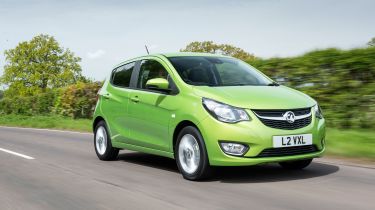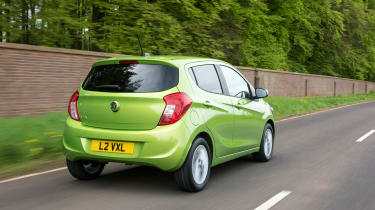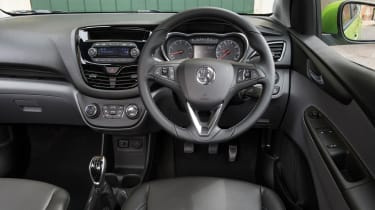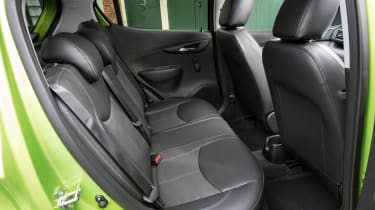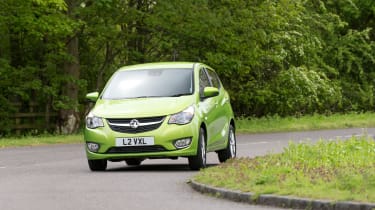New Vauxhall Viva 2015 review
Vauxhall's Viva arrives in the crowded city car segment offering a well-rounded package at the right price

The new Vauxhall Viva is a worthy addition to the city car segment. While it doesn’t really move the game on, it does represent impressive value for money – with even this top-spec model coming in at under £10,000. If you spend all your driving time in town, the Viva could suit you down to the ground.
The Vauxhall Viva started life as a small family saloon car back in the 1960s, but after 16 years and more than 1.5 million units, the nameplate was consigned to the history books.
Or so we thought. Vauxhall has decided to revive the Viva badge this year with a brand new Vauxhall Viva city car – designed to rival models like the Hyundai i10, Citroen C1, and our current favourite, the Skoda Citigo.
On paper, things look good. Prices start from just £7,995, with even the basic SE getting five seats, electric front windows, cruise control and a trip computer. It’s the top-spec SL that looks the best value though, adding kit like climate control, Bluetooth and alloy wheels, all for just £1,500 extra.
Quality is pretty good, actually, given the fact that Vauxhall Viva sits right at the bottom of the new car market. It’s not quite up to the standards of VW’s up! or even the i10, but it’s more than a match for the Suzuki Celerio that’s priced at very similar levels.
Used - available now

2023 MINI
Cooper Electric
22,248 milesAutomaticElectric
Cash £12,687
2021 Nissan
Leaf
17,471 milesAutomaticElectric
Cash £11,387
2022 Citroen
e-C4
27,861 milesAutomaticElectric
Cash £12,987
2020 Ford
Focus
17,904 milesManualPetrol1.0L
Cash £14,400As you’d expect, entry-level SE cars get some scratchy plastics on the dash, but the SL adds a two-tone grey and black fascia and chrome flashes on the interior door handles. It also gets privacy glass on the rear windows, and a leather-wrapped steering wheel.
All models use the same 1.0-litre engine, with 74bhp and just 95Nm of torque. However, that’s enough to make the Viva feel fairly nippy around town. SE cars are available in slightly more frugal ecoFLEX trim, adding low rolling resistance tyres as well as front and rear spoilers.
This helps drop CO2 emissions below the magic 100g/km barrier for free road tax. The car in our pictures emits 104g/km for £20 annual VED, while all Viva models are quoted to do more than 60mpg on the combined cycle.
On the open road though, the Viva needs to be thrashed to within an inch of its life to make decent progress. Granted, this car will primarily be used in and around urban areas, but if your daily commute utilises faster roads, we’d recommend opting for the more grown-up Citigo or Hyundai i10. That said, body roll is well controlled, and the ride stays just the right side of firm.
Road noise is a bit of an issue, sending an unwelcome din into the cabin and effectively masking any sort of engine or wind roar. If you stick to 60mph you’ll be fine, but anything more requires raised voices for front and rear passengers.
The Viva’s practicality is good, if not quite class leading. There’s decent space in the back for a six-footer to sit behind a similarly-sized driver, and the boot will hold 206 litres of luggage. There’s no under-floor storage and no spare wheel – though one can be added from the relatively measly options list. For comparison, the VW Group trio (up!, Citigo, Mii) measure in at 251 litres, while the current class champ is the Suzuki Celerio with 254 litres.
Up front, the seats offer decent support, and all models get a height-adjustable driver’s seat. The steering wheel only adjusts for tilt though, so if you find yourself sitting too close, your only option is to slide the seat right back. Avoid the optional sunroof and there’s plenty of headroom, too.
The Vauxhall Viva is certainly an interesting proposition for customers in the market for an A-segment city car. Vauxhall has openly admitted it is targeting cautious, price conscious, A to B motorists, who appreciate the convenience of a small five-door runaround. If you think of it like that and nothing more, the Viva is a well-rounded – if rather emotionless – small car.
Next year, Vauxhall will offer buyers the Intelilink touchscreen from the Corsa and Adam, as well as the innovative On-Star concierge service, whereby drivers will be able to call a company representative to automatically plumb in POIs and specific destinations to the car’s sat-nav. Apple CarPlay and Android Auto will also feature at a later date, with Vauxhall claiming to be the only manufacturer to offer both systems on a single car.

